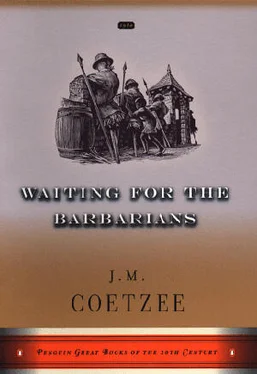When they were first quartered on the town these soldiers, strangers to our ways, conscripts from all over the Empire, were welcomed coolly. "We don't need them here," people said, "the sooner they go out and fight the barbarians the better." They were denied credit in the shops, mothers locked their daughters away from them. But after the barbarians made their appearance on our doorstep that attitude changed. Now that they seem to be all that stands between us and destruction, these foreign soldiers are anxiously courted. A committee of citizens makes a weekly levy to hold a feast for them, roasting whole sheep on spits, laying out gallons of ram. The girls of the town are theirs for the taking. They are welcome to whatever they want as long as they will stay and guard our lives. And the more they are fawned on, the more their arrogance grows. We know we cannot rely on them. With the granary nearly empty and the main force vanished like smoke, what is there to hold them once the feasting stops? All we can hope for is that they will be deterred from deserting us by the rigours of winter travel.
For premonitions of winter are everywhere. In the early hours of the morning a chilly breeze rises in the north: the shutters creak, sleepers huddle closer, the sentries wrap their cloaks tight, turn their backs. Some nights I wake up shivering on my bed of sacks and cannot get to sleep again. When the sun comes up it seems farther away each day; the earth grows cold even before sunset. I think of the little convoys of travellers strung out along hundreds of miles of road, heading for a motherland most have never seen, pushing their handcarts, goading their horses, carrying their children, nursing their provisions, day by day abandoning at the roadside tools, kitchenware, portraits, clocks, toys, everything they believed they might rescue from the ruin of their estates before they realized that at most they might hope to escape with their lives. In a week or two the weather will be too treacherous for any but the hardiest to set out. The bleak north wind will be howling all day, withering life on the stalk, carrying a sea of dust across the wide plateau, bringing sudden flurries of hail and snow. I cannot imagine myself, with my tattered clothes and cast-off sandals, stick in hand, pack on back, surviving that long march. My heart would not be in it. What life can I hope for away from this oasis? The life of an indigent bookkeeper in the capital, coming back every evening after dusk to a rented room in a back street, with my teeth slowly falling out and the landlady sniffing at the door? If I were to join the exodus it would be as one of those unobtrusive old folk who one day slip away from the line of march, settle down in the lee of a rock, and wait for the last great cold to begin creeping up their legs.
* *
I wander down the wide road down to the lakeside. The horizon ahead is already grey, merging into the grey water of the lake. Behind me the sun is setting in streaks of gold and crimson. From the ditches comes the first cricketsong. This is a world I know and love and do not want to leave. I have walked this road by night since my youth and come to no harm. How can I believe that the night is full of the flitting shadows of barbarians? If there were strangers here I would feel it in my bones. The barbarians have withdrawn with their flocks into the deepest mountain valleys, waiting for the soldiers to grow tired and go away. When that happens the barbarians will come out again. They will graze their sheep and leave us alone, we will plant our fields and leave them alone, and in a few years the frontier will be restored to peace.
I pass the ruined fields, cleared by now and ploughed afresh, cross the irrigation ditches and the shore-wall. The ground beneath my soles grows soft; soon I am walking on soggy marshgrass, pushing my way through reedbrakes, striding ankle-deep in water in the last violet light of dusk. Frogs plop into the water before me; nearby I hear a faint rustle of feathers as a marshbird crouches ready to fly.
I wade deeper, parting the reeds with my hands, feeling the cool slime between my toes; the water, holding the warmth of the sun longer than the air, resists, then gives way, before each stride. In the early hours of the morning the fishermen pole their flat-bottomed boats out across this calm surface and cast their nets. What a peaceful way to make a living! Perhaps I should leave off my beggar's trade and join them in their camp outside the wall, build myself a hut of mud and reeds, marry one of their pretty daughters, feast when the catch is plentiful, tighten my belt when it is not.
Calf-deep in the soothing water I indulge myself in this wistful vision. I am not unaware of what such daydreams signify, dreams of becoming an unthinking savage, of taking the cold road back to the capital, of groping my way out to the ruins in the desert, of returning to the confinement of my cell, of seeking out the barbarians and offering myself to them to use as they wish. Without exception they are dreams of ends: dreams not of how to live but of how to die. And everyone, I know, in that walled town sinking now into darkness (I hear the two thin trumpet calls that announce the closing of the gates) is similarly preoccupied. Everyone but the children! The children never doubt that the great old trees in whose shade they play will stand forever, that one day they will grow to be strong like their fathers, fertile like their mothers, that they will live and prosper and raise their own children and grow old in the place where they were born. What has made it impossible for us to live in time like fish in water, like birds in air, like children? It is the fault of Empire! Empire has created the time of history. Empire has located its existence not in the smooth recurrent spinning time of the cycle of the seasons but in the jagged time of rise and fall, of beginning and end, of catastrophe. Empire dooms itself to live in history and plot against history. One thought alone preoccupies the submerged mind of Empire: how not to end, how not to die, how to prolong its era. By day it pursues its enemies. It is cunning and ruthless, it sends its bloodhounds everywhere. By night it feeds on images of disaster: the sack of cities, the rape of populations, pyramids of bones, acres of desolation. A mad vision yet a virulent one: I, wading in the ooze, am no less infected with it than the faithful Colonel Joll as he tracks the enemies of Empire through the boundless desert, sword unsheathed to cut down barbarian after barbarian until at last he finds and slays the one whose destiny it should be (or if not he then his son's or unborn grandson's) to climb the bronze gateway to the Summer Palace and topple the globe surmounted by the tiger rampant that symbolizes eternal dominion, while his comrades below cheer and fire their muskets in the air.
There is no moon. In darkness I grope my way back to dry land and on a bed of grass, wrapped in my cloak, fall asleep. I wake up stiff and cold from a flurry of confused dreams. The red star has barely moved in the sky.
As I pass along the road to the fishermen's camp a dog starts to bark; in a moment it is joined by another, and the night bursts out in a clamour of barking, shouts of alarm, screams. Dismayed, I shout out at the top of my voice, "It is nothing!" but I am not heard. I stand helpless in the middle of the road. Someone runs past me down towards the lake; then another body cannons into me, a woman, I know at once, who gasps in terror in my arms before she breaks free and is gone. There are dogs, too, snarling about me: I whirl and cry out as one snaps at my legs, tears my skin, retreats. The frenzied yapping is all round me. From behind the walls the dogs of the town bay their response. I crouch and circle, tensed for the next attack. The brassy wail of trumpets cuts through the air. The dogs bark louder than ever. Slowly I shuffle towards the camp, till one of the huts suddenly looms against the sky. I push aside the mat that hangs over the doorway and pass into the sweaty warmth where until a few minutes ago people slept.
Читать дальше












